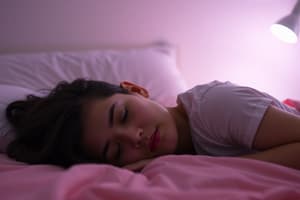Podcast
Questions and Answers
What is partial sleep deprivation?
What is partial sleep deprivation?
The experience of achieving inadequate sleep in terms of quantity or quality.
Which of the following are effects of partial sleep deprivation?
Which of the following are effects of partial sleep deprivation?
- Mood swings (correct)
- Increased memory
- Enhanced concentration
- Impaired problem solving (correct)
A full night's sleep deprivation refers to having no sleep within 24 hours.
A full night's sleep deprivation refers to having no sleep within 24 hours.
True (A)
What can chronic sleep deprivation lead to?
What can chronic sleep deprivation lead to?
What percentage of fatal road accidents are due to driver fatigue?
What percentage of fatal road accidents are due to driver fatigue?
Which of the following is NOT a cognitive effect of partial sleep deprivation?
Which of the following is NOT a cognitive effect of partial sleep deprivation?
The observable actions affected by partial sleep deprivation are referred to as ______.
The observable actions affected by partial sleep deprivation are referred to as ______.
Emotional experiences affected by partial sleep deprivation fall under the category of ______.
Emotional experiences affected by partial sleep deprivation fall under the category of ______.
What is a common physical effect of partial sleep deprivation?
What is a common physical effect of partial sleep deprivation?
What is a circadian rhythm disorder?
What is a circadian rhythm disorder?
What is Delayed Sleep Phase Syndrome (DSPS)?
What is Delayed Sleep Phase Syndrome (DSPS)?
What are the symptoms of circadian rhythm sleep disorders during daytime?
What are the symptoms of circadian rhythm sleep disorders during daytime?
What are the symptoms of circadian rhythm sleep disorders at nighttime?
What are the symptoms of circadian rhythm sleep disorders at nighttime?
What is the primary treatment for circadian rhythm sleep disorders?
What is the primary treatment for circadian rhythm sleep disorders?
Bright light therapy involves regular, timed exposure to _____ amount of light.
Bright light therapy involves regular, timed exposure to _____ amount of light.
Match the following circadian rhythm disorders with their definitions:
Match the following circadian rhythm disorders with their definitions:
Flashcards are hidden until you start studying
Study Notes
Partial Sleep Deprivation
- Defined as inadequate sleep in terms of both quantity (objective time measurement) and quality (subjective self-report measures).
- A full night’s sleep deprivation refers to no sleep within a 24-hour period.
Effects on Functioning (Affective, Behavioral, Cognitive)
-
Affective Effects
- Issues with emotion regulation and control.
- Mood swings, emotional outbursts, sadness, irritability, and feelings of depression.
- Increased susceptibility to crying without apparent reason.
-
Behavioral Effects
- Difficulty controlling actions, leading to increased risk-taking and impulsive behaviors.
- Slower task completion and reduced productivity.
- Reluctance to get out of bed and a higher likelihood of accidents.
- Hyperactivity in children may occur alongside increased misbehavior.
-
Cognitive Effects
- Memory troubles and decreased alertness.
- Poor concentration and impaired problem-solving abilities.
- Difficulty making decisions and poor judgment.
- Lack of motivation and challenges coping with stress.
- Diificulty learning new concepts, with a shortened attention span and slower thinking.
Physical (Biological) Effects
- Common symptoms include shaking hands, slurred speech, difficulty focusing, and lack of energy.
- Increased pain sensitivity due to sleep deprivation.
- Chronic sleep deprivation is linked to long-term health issues such as hypertension, obesity, and diabetes, driven by elevated cortisol levels when deprived of sleep.
Real-world Implications
- Driver fatigue contributes to approximately 20% of fatal road accidents.
- An average of one Australian dies each day due to falling asleep at the wheel, emphasizing the dangers associated with drowsy driving.
- About 29% of adults admit to driving while drowsy, highlighting a significant public safety issue.
Circadian Rhythm Sleep Disorders
- Defined as a category of sleep disorders where sleep patterns are disrupted due to a mismatch between circadian rhythms and external sleep-wake schedules.
- Includes Delayed Sleep Phase Syndrome (DSPS), Advanced Sleep Phase Disorder (ASPD), and shift work.
- Can arise from internal factors (such as age and hormones) and external factors (like shift work and social commitments).
Delayed Sleep Phase Syndrome (DSPS)
- Characterized by a significant delay (at least two hours) in sleep onset and waking time compared to desired schedules.
- Can lead to excessive daytime sleepiness and impaired functioning due to sleep deprivation if not compensated by delayed wakefulness.
Advanced Sleep Phase Disorder (ASPD)
- Involves an earlier sleep onset and wake time than desired, leading to difficulty staying awake during evening hours and early morning awakenings.
Shift Work
- Results in irregular sleep patterns due to working hours that conflict with traditional day-night cycles.
- Causes fatigue and disruptions in circadian rhythms, making it challenging to maintain alertness and effective functioning.
Symptoms of Circadian Rhythm Sleep Disorders
- Excessive tiredness and a strong desire to sleep during the day.
- Difficulty falling asleep or staying asleep at required times.
- Lethargy and difficulty waking up at the desired times.
- Impaired cognitive functions, such as learning and memory.
- Mood swings and decreased emotional control.
Bright Light Therapy
- Involves regular, timed exposure to safe, intense light to realign a person's sleep-wake cycles with external cues.
- Effectiveness depends on the timing, duration, and intensity of light exposure based on the specific sleep disorder.
- Encourages melatonin release at appropriate times, promoting sleepiness, or reduces melatonin to enhance wakefulness.
Treatment Applicability
- Bright light therapy can effectively manage circadian rhythm disorders by adjusting sleep-wake timing to align with environmental cues.
- Implementation requires careful planning according to the individual's specific disorder and lifestyle.
Studying That Suits You
Use AI to generate personalized quizzes and flashcards to suit your learning preferences.



